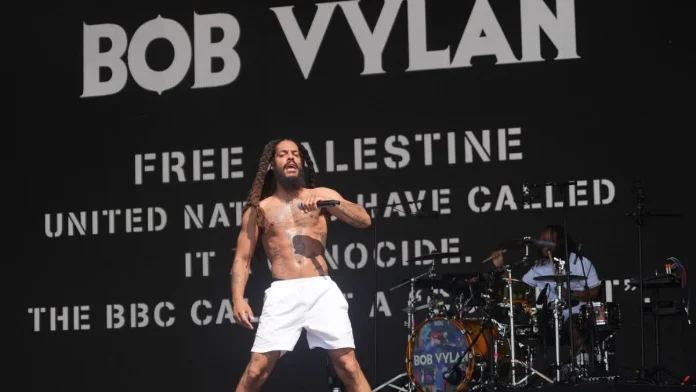The Chief Rabbi has described the words shouted at Glastonbury – “death to the IDF” – as a “national shame”. But I would argue that the real national shame is far worse, and far more enduring: our government’s continued complicity in mass killing through the provision of arms, political cover, and moral cowardice. What happened on that stage was not “vile Jew-hatred”. It was a protest against a military force carrying out a sustained assault on civilians. And for saying it out loud, the artist is now being investigated, smeared, and accused of incitement. That is shameful.
Let’s be absolutely clear about what was said, and what wasn’t. Bob Vylan did not chant “death to Jews”. He did not attack Judaism, Jewish culture, or the Jewish community. He attacked the Israeli military – the IDF – in blunt terms. Many of us might not have used those exact words, but the message behind them is undeniable: fury at a military force currently engaged in the destruction of Gaza, where entire families have been wiped out and where human rights organisations have warned of possible genocide. This is not fringe paranoia. This is the repeated assessment of the UN, of aid workers, of journalists on the ground.
And yet, instead of grappling with the horror of that war, we are told that the real threat to our country is a protest chant. It is a staggering moral inversion. It is also politically calculated. The aim is to shift focus away from the atrocities, and onto the critics. To police outrage. To sanitise protest. And ultimately, to protect Israel from the kind of condemnation that would be automatic if any other state had committed similar acts.
Ask yourself this: would there have been the same outrage if the artist had chanted “death to the Russian army”? Or “death to the Saudi regime”? Would the police be investigating, the Culture Secretary condemning, and public figures rushing to denounce it as hate speech? Of course not. This is a very specific, very selective outrage. And it’s being used to equate political protest with racial hatred – something that should deeply concern anyone who values free expression.
What’s even more disturbing is the implication that to criticise the Israeli military is to somehow offend Britain itself. That’s what lies beneath the Chief Rabbi’s words – his use of phrases like “our nation” and “national shame” while defending a foreign army. He is entitled to his opinion, as we all are. But when he speaks in a way that merges religious leadership with political advocacy for Israel, it blurs the line between faith and nationalism in a deeply uncomfortable way.
The Chief Rabbi does not speak for all Jews in Britain – many of whom are horrified by what Israel is doing in Gaza, and do not wish to see their religion used to justify or deflect from state violence. Nor does he speak for the broader public, who are increasingly seeing through the double standards and silencing tactics used whenever Israel is criticised.
What Bob Vylan did was uncomfortable, yes. Protest often is. It disrupts, it provokes, it calls things what they are. But his words reflect the anger and despair of many who feel powerless while watching scenes of death and devastation night after night. And in a country where our government continues to license weapons used in those bombings, where our politicians talk of Israel’s “right to defend itself” while entire neighbourhoods are obliterated, that anger is not just understandable – it is necessary.
We should be far more worried about the fact that protest is being criminalised, that speech is being surveilled, and that criticism of one particular state is increasingly off-limits. Britain is not supposed to be a place where artists are investigated for chanting against a foreign army. And yet here we are, with police forces reviewing live performance footage and ministers making political capital out of what was said on stage – while remaining silent about what is happening in Gaza.
There is a moral sickness at the heart of this conversation. And it lies not with a punk band shouting at a festival, but with those who would rather punish speech than confront complicity. We are being told that anger at mass killing is more dangerous than the killing itself. That chanting on a stage is more offensive than flattening refugee camps. That protest is the real threat – not the bombs, not the deaths, not the arms sales.
We are not fools. We see what is happening. And we see who is being protected.
The real national shame is not in Glastonbury. It is in Whitehall. It is in the silence of our opposition parties. It is in the calculations of our diplomats. And yes – it is in the statements of public figures who conflate a chant against soldiers with an attack on an entire people.
Enough. We must reclaim the moral ground. Criticising Israel is not antisemitism. Condemning the IDF is not hate speech. And expressing fury at injustice – especially in the language of protest and art – must never be treated as a crime.
If we allow it to be, then we really will have something to be ashamed of.
